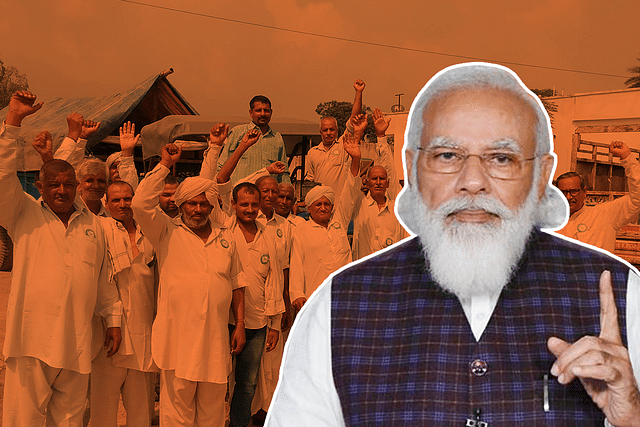
MSP-DBT Linkage Is Another Step In The Direction Of Elimination Of Middlemen
By linking MSP with DBT, the government has given a body-blow to the middlemen and their feigned interest in farmers’ agitation.
Arhtiyas or bichauliyas the two interchangeable terms with belittling implications of crafty and grabbing middlemen are going to curse the Narendra Modi government even more for its MSP-DBT dovetail — mandated from the current rabi marketing season — after having spearheaded the unending farmers’ agitation with ulterior motives in the manner of wolf wearing sheep’s clothing.
Direct benefit transfers (DBT) was hitherto linked with doles and welfare payments like pension and gas subsidy. Now Aadhaar-mobile-numbers-linked bank accounts of farmers would be credited with minimum support price (MSP) the government procuring agency Food Corporation of India (FCI) has to pay them.
The wily arhtiyas, especially in the two granary states of Punjab and Haryana, have been having a stranglehold on farmers by doubling as financiers-cum-marketing-agency thus condescending to pass on the MSP received in bulk by them to the extent they pleased after deducting their usury interest and service charges as well as the principal loan amounts.
The government has by linking MSP with DBT, which it should have done long ago, delinked MSP from middlemen thereby giving a body-blow to them and their feigned interest in farmers’ agitation.
Now all that they would get for their services in loading at the farm and unloading at the procurement centres is a transparent 2.5 per cent commission. This is as it should be.
Lest the sulking arhtiyas vengefully strike at the poor small farmers by denying them sowing and other credits, the government must exhort these farmers to embrace formal banking and take agricultural loans.
Producers’ cooperatives are what the doctor had ordered but till they take firm roots, mainstream and regional cooperative banks should give a helping hand.
Food-processing industries to which also the farmers can sell directly if they find the MSP less attractive would also shy away from the arhtiyas and reach out to the small farmers with fair prices in the sobering knowledge that otherwise they would lose out to the state procurement apparatus.
Kulaks and arhtiyas have been at the forefront of the farmers’ agitation opposing with visceral hatred the Modi government’s sincere desire to eliminate middlemen and make MSP broad-based as against being kulak centered.
To make public procurement and its concomitant MSP truly broad-based the government should put a cap on what each farmer can sell under the MSP regime.
The average farm size is 1.08 hectares (agriculture census 2015-16) and this should be the maximum land the produce from which will be bought under the MSP scheme so that large farmers with disproportionate clout do not elbow out the smaller ones. MSP after all was not designed for kulaks though right from its inception it has degenerated into serving their interests alone.
While food processing industry is vital for the growth of the farming sector, we also need retail stores like Wal-Mart for enabling and actuating the seemingly utopian vision of farm to fork linkage.
Food processing units existing cheek by jowl with farms cannot buy all that is grown and cultivated by farmers. Middlemen step into fill the void by buying at throwaway prices from farmers, vegetables and fruits and unloading them for mindboggling and unconscionable profits at the urban consumption centres.
Retail stores procuring direct from small vegetable and fruits farmers too should be encouraged with a regime akin to MSP-DBT.
There is no reason why big retail procuring farm fresh products and establishing cold storage chains along the route to the urban consumption centres should not directly pay the small farmers taking a leaf out of the MSP-DBT model or independently of it under contract farming which once again eliminates the dubious role of middlemen.